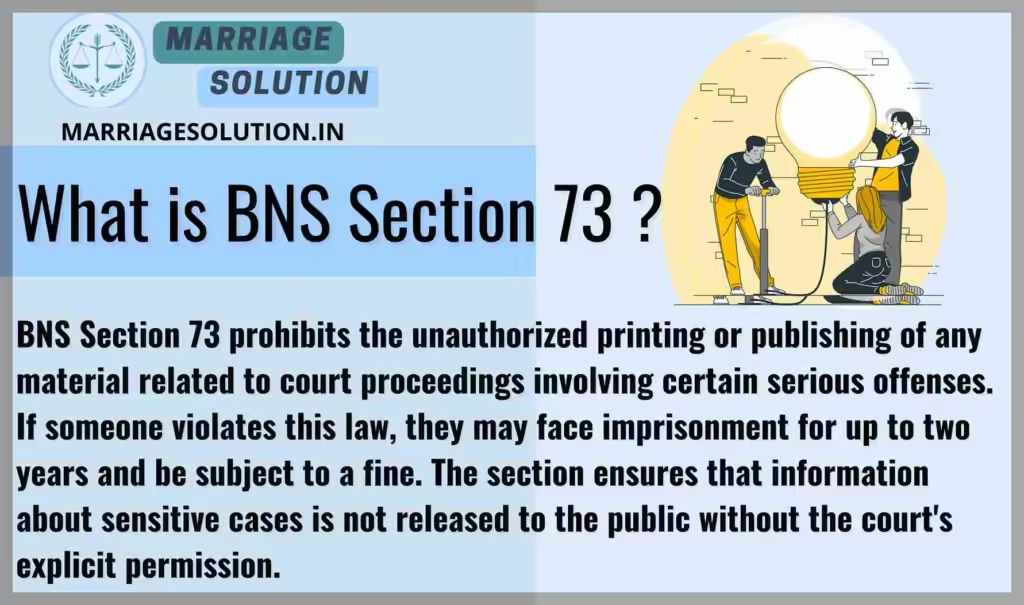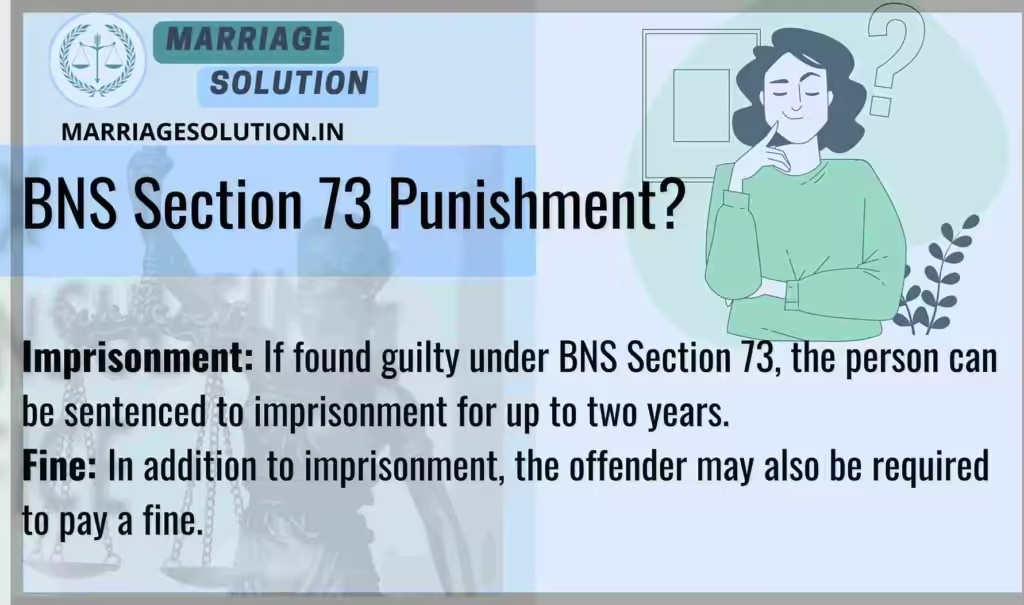Introduction of BNS Section 73
BNS Section 73 is designed to regulate the printing or publishing of any material related to court proceedings without prior permission from the court. This section aims to protect the integrity of legal processes and ensure that sensitive information is not disclosed to the public without proper authorization.
What is section 73 of BNS ?
BNS Section 73 prohibits the unauthorized printing or publishing of any material related to court proceedings involving certain serious offenses. If someone violates this law, they may face imprisonment for up to two years and be subject to a fine. The section ensures that information about sensitive cases is not released to the public without the court’s explicit permission.

BNS Section 73 in Simple Points
(This provision corresponds to the earlier IPC Section 228A (in part) and has been restructured under the Bharatiya Nyaya Sanhita (BNS), 2023.)
1. Meaning of Section 73
BNS Section 73 makes it illegal to print or publish any matter related to certain court proceedings without prior permission from the court.
The purpose is to stop unauthorized disclosure of sensitive details in ongoing trials, especially in serious offences, so that justice is not influenced by public opinion or media trials.
2. Purpose of Section 73
The section ensures:
- Fair trial by preventing premature publicity or biased reporting.
- Privacy of victims, witnesses, and accused persons in sensitive cases.
- Judicial integrity by allowing courts to control what can be published.
- Balance between transparency and restriction – while judgments of High Courts and Supreme Court can be published, sensitive trial proceedings cannot be disclosed without consent.
3. Essential Ingredients of Section 73
For this section to apply, the following conditions must be met:
- The information relates to an ongoing court proceeding of certain serious offences.
- The person publishes, prints, or circulates such information without court permission.
- The act has the potential to influence the trial, reveal sensitive information, or harm the privacy of involved persons.
- The offence is considered cognizable (police can arrest without warrant) and bailable.
4. Punishment under BNS Section 73
- Imprisonment: Up to 2 years.
- Fine: Additional fine may also be imposed.
- The punishment serves as both a deterrent and a safeguard to protect sensitive legal matters.
5. Examples of Section 73 in Action
- Example 1: A journalist publishes a detailed article about witness testimonies in a rape trial without court approval. This is a violation of Section 73.
- Example 2: A blog reveals private details of a terrorism case under trial. This disclosure without permission can attract punishment.
- Counter-Example: A Supreme Court judgment is published in newspapers. This is not a violation, since judgments of higher courts are exempt.
6. Importance of Section 73
BNS Section 73 is vital because:
- It prevents media trials and protects the fairness of judicial proceedings.
- It protects privacy and dignity of victims and witnesses.
- It maintains balance by allowing transparency in final judgments but restricting premature disclosures.
- It strengthens public trust in the justice system by ensuring that cases are decided inside the courtroom, not in the media.
Section 73 BNS Overview
BNSS Section 73 lays down rules for publishing or printing information about court proceedings. It prohibits the publication of certain sensitive case details without prior approval from the court. This ensures that ongoing cases are not influenced by media trials, public pressure, or privacy breaches. By enforcing penalties, the section aims to protect both the fairness of the judicial process and the rights of individuals involved in serious cases.
BNS Section 73 : 10 Key Point
1. Protection of Legal Integrity
The main goal of Section 73 is to maintain the fairness and integrity of the legal system. Unauthorized publications can create bias, spread misinformation, and even influence witnesses or judges. By restricting such publications, the law ensures that justice is delivered based on evidence, not external influence.
2. Requirement for Court Permission
Before any individual or media outlet prints or publishes material related to a pending case, they must obtain permission from the court. This prevents the premature release of information that could damage the credibility of the trial or expose victims and witnesses.
3. Imprisonment as a Deterrent
Violation of this section can result in up to two years of imprisonment. This penalty acts as a deterrent, reminding publishers and journalists to respect court orders before releasing sensitive case information.
4. Monetary Fines as Punishment
In addition to jail time, violators may also face fines. The fine ensures that even if imprisonment is not imposed, the offender still suffers financial consequences for breaching the law.
5. Cognizable Offense
The offence under Section 73 is cognizable, which means police can arrest the offender without a warrant. This highlights the seriousness of unauthorized publications and allows quick action to prevent further harm.
6. Bailable Offense
Even though it is serious, the offence is bailable, meaning the accused can apply for bail and avoid being held in custody while awaiting trial. This balances punishment with the right to liberty.
7. Applicability to Specific Offenses
The provision is especially relevant in sensitive cases such as rape trials, high-profile criminal cases, or terrorism cases, where premature publicity could jeopardize fairness or endanger individuals.
8. Exemptions for Higher Court Judgments
The law makes an exception for judgments of the High Court and Supreme Court, which can be published openly. This ensures transparency at the highest levels of justice, where decisions set important legal precedents.
9. Triable by Any Magistrate
Cases under Section 73 can be tried by any magistrate, which makes the legal process quicker and ensures that offenders are prosecuted without unnecessary delay.
10. Ensuring Privacy and Fairness
This provision also protects the privacy of victims, witnesses, and accused persons in sensitive cases. It prevents social stigma, media trials, and external pressures from interfering with court proceedings, ensuring that justice is free from bias or outside influence.
Examples
- Example 1: A newspaper publishes an article detailing sensitive information about an ongoing court case involving a high-profile crime without obtaining permission from the court. The publication of this information could influence public opinion and potentially impact the fairness of the trial. Under BNS Section 73, the publisher could be charged with unauthorized publication, leading to imprisonment and a fine.
- Example 2: A journalist writes a blog post revealing details about a court proceeding related to a sexual offense case. The post includes information that could identify the victim, which is prohibited without court approval. The journalist could be prosecuted under BNS Section 73 for disclosing sensitive information, facing imprisonment and a fine as a result.
BNS 73 Punishment
Imprisonment: If found guilty under BNS Section 73, the person can be sentenced to imprisonment for up to two years.
Fine: In addition to imprisonment, the offender may also be required to pay a fine.

BNS 73 bailable or not ?
Yes, BNS Section 73 is a bailable offense. This means that the accused has the right to seek bail and avoid detention while awaiting trial.
Comparison: BNS Section 73 vs IPC Section 228A (Publishing Court Proceedings & Victim Identity)
| Section | Offence | Punishment | Bailable / Non-Bailable | Cognizable / Non-Cognizable | Trial By |
|---|---|---|---|---|---|
| BNS Section 73 | Printing or publishing material about court proceedings (in certain sensitive cases) without prior permission from the court. Protects fair trial and privacy. | Imprisonment up to 2 years, and a fine. Both may be imposed together. | Bailable | Cognizable | Any Magistrate |
| IPC Section 228A (Old) | Prohibits printing or publishing the identity of victims in rape and certain sexual offence cases (name, address, family details, photos, etc.) without consent or court order. | Imprisonment up to 2 years and fine. (Same maximum penalty as BNS 73 for disclosure-related publishing.) | Bailable | Cognizable | Any Magistrate |
BNS Section 73 FAQs
What does BNS Section 73 cover?
It covers the prohibition of unauthorized printing or publishing of court-related material for certain offenses.
What is the punishment under BNS Section 73?
The punishment can be imprisonment for up to two years and a fine.
Is BNS Section 73 a bailable offense?
Yes, it is a bailable offense.
Who can try offenses under BNS Section 73?
Any magistrate has the authority to try these offenses.
Conclusion
BNS Section 73 plays an important role in protecting the fairness and credibility of the justice system. By prohibiting the unauthorized printing or publishing of sensitive court proceedings, it ensures that trials are conducted without media trials, undue influence, or invasion of privacy. The section strikes a balance between the freedom of the press and the right to a fair trial, allowing only authorized information to be published.
With penalties of imprisonment up to two years and fines, the law sends a clear message that the sanctity of judicial proceedings must be preserved. At the same time, it makes exceptions for judgments of higher courts to maintain transparency in justice delivery.
In simple terms, BNS Section 73 safeguards both legal integrity and individual rights, ensuring that the judicial process remains unbiased, dignified, and free from outside pressure.
Need Legal Support?
If you are dealing with court cases, marriage problems, or any other legal issue, our team at Marriage Solution – Lawyer Help is here for you. Simply fill out our quick online enquiry form, and we’ll connect you with the right legal expert to support your needs.
Finished with BNS 73 ? Continue exploring the next provisions of the Bharatiya Nyaya Sanhita (BNS), 2023. Each section includes explanations, examples, and plain-language breakdowns for easy understanding.
- Section 74 BNS : Assault or criminal force to woman with intent to outrage her modesty.
- https://marriagesolution.in/bns_section/section-74-bns/
- BNS Section 75 : Sexual harassment and punishment for sexual harassment .
- https://marriagesolution.in/bns_section/bns-section-75/
- BNS Section 76 : Assault or use of criminal force to woman with intent to disrobe .
- https://marriagesolution.in/bns_section/bns-section-76/
- Section 77 BNS : Voyeurism .
- https://marriagesolution.in/bns_section/section-77-bns/
- BNS Section 78 : Stalking .
- https://marriagesolution.in/bns_section/bns-section-78/
Full IPC Section List: https://marriagesolution.in/ipc-section-list
All Indian Law & Blogs: https://marriagesolution.in/indian-law/
Full BNSS Section List: https://marriagesolution.in/bnss_section-list
